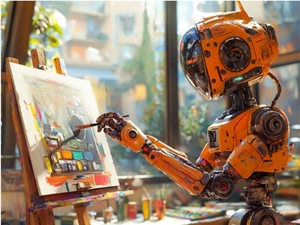Behind the glittering lights of Hollywood, a battle concerning actors' survival rights is unfolding. On August 1st, over 300 video game and Hollywood actors gathered at the Warner Bros. Studios, raising protest flags. Their demand is singular: to safeguard their rights amid the tide of artificial intelligence.
This protest did not arise without cause. Just a week prior, game workers from the Screen Actors Guild‐American Federation of Television and Radio Artists (SAG-AFTRA) voted to strike. They had engaged in 18 months of negotiations with gaming giants, aiming to reach a consensus on a new interactive media agreement, but hit a deadlock over protections for AI usage.

Image source note: The image was generated by AI, authorized by Midjourney
Standing before the protesting crowd, SAG-AFTRA's National Executive Director, Duncan Crabtree-Ireland, voiced the actors' concerns: "We have agreements with film studios, streaming platforms, and even major record companies that provide our members with informed consent and fair compensation. Yet, for some reason, video game companies refuse to do the same. This will be their Achilles' heel."
For actors, the threat of AI is a matter of survival. They fear their voices and images will be replicated by AI and used without consent or fair remuneration. More alarming is that in the gaming industry, this threat is even more severe than in film and television. In games, creating convincing digital replicas has become cheaper and easier.
Constantine Anthony, a Burbank city council member and SAG-AFTRA member at the protest site, expressed the actors' sentiments: "Most people still want real people to tell stories, not AI. The gaming companies aim to recreate our images through advancing technology, so they won't need us anymore. We stand here today, just asking them to fairly compensate those who tell stories."
However, this protest is not a one-sided accusation. Audrey Kurth, a spokesperson for the video game production side, stated that the company has already provided AI protection measures and promised "to significantly increase the wages of SAG-AFTRA-represented video game actors."
But SAG-AFTRA's negotiating committee believes the crux of the issue lies in who qualifies as a "performer." Ray Rodriguez, SAG-AFTRA's Chief Contract Officer, revealed at a press conference: "The industry clearly tells us they do not consider all those who perform actions as performers covered by the collective bargaining agreement." He added that some physical performances are even regarded as "data."
In this game of interests, the gap between the two sides is evident. According to data from gaming market prediction firm Newzoo, the global video game industry's revenue reached a staggering $184 billion in 2023, projected to grow to $207 billion by 2026. Facing such a large pie, actors merely hope to get their fair share.
Kurth stated: "We are at the negotiating table because we want to include SAG-AFTRA-represented performers in our productions. We will continue to work on resolving the remaining issues in these negotiations. Our goal is to reach an agreement with the union to end this strike."
This protest is not just about actors' rights; it's a contest between humanity and technology in the age of AI. In this rapidly evolving digital world, can we still hold onto the bottom line of humanity? The actors' struggle might be speaking up for all of us.









